Onafhankelijk van geboortedata
De Amerikaanse predikant, blogger en dichter Chad Ashby bracht vier jaar door als DJ voor WSAJ, Grove City College Radio, voordat hij zich richtte op meer volwassen activiteiten op het Southern Seminary, waar hij de graad Master of Divinity behaalde. Hij is nu predikant aan de College Street Baptist Church in Newberry, South Carolina, waar hij nog steeds een schizofrene smaak cultiveert voor folk, hiphop, jazz, indie rock, funk en 4th c. hymnodie. Hij en zijn vrouw, Mindy, hebben drie jongens en hij blogt regelmatig op After + Math.
Uit: Dave Eggers’s The Circle : A Social Media Dystopia
« When it comes to dystopian novels, George Orwell’s 1984 has been the standard for over half a century. It is no surprise that David Eggers’s The Circle feels like an unashamed update of that foreboding work. In fact, Eggers has woven intentional homages throughout. The story is told from the perspective of Mae, a newly hired employee at The Circle (think Google, Apple, and Facebook rolled into one). The Circle is a blur of social media smiles and frowns (likes and dislikes) and constant a barrage of screens. Refusing to be flustered, Mae quickly adapts to the fast-paced culture and becomes determined to excel. As the story progresses, Mae faces difficult choices, each threatening to swallow more of her personal identity. She learns, perhaps too late, that The Circle has quite a voracious appetite.
Eggers presents a society where the general public willingly and enthusiastically surrenders the right to privacy. Throughout the book, The Circle rolls out various new technologies in Apple product-reveal fashion, each more worrying to the reader than the next. However, the exciting prospect of eradicating social evils like crime, child abduction, and disease creates a smoke-and-mirrors situation. The public cannot see past the flash and bang to the real dangers of these unbridled technologies. Each time The Circle rolls out a new concept, society cries out via social media for its instant and unequivocal adoption. And of course, The Circle is more than willing to oblige the cries of the mob.
Like 1984, surveillance becomes a central tool of The Circle’s power. Cameras hidden on every beach, by city block, and in every house encourage conformity and discourage crime and aberrant behaviors. (To put things in perspective, Periscope was just coming out the summer I picked up this novel.) Politicians go “transparent,” wearing cameras at all times to prevent government corruption. Interestingly, in a world where Mae is never alone, we find that she is never fully herself. It’s a society where all citizens lose their true identities as they seek to maintain, primp, and improve their social media identity—the TruYou.
There is certain poetic irony to social media driving individuals further from one another. As the story develops, Mae becomes distant from everyone who matters in her life. By the close of the novel, she loses contact with her parents, her best friend, and her ex-boyfriend because of her involvement at The Circle. She takes solace in knowing that the online community will comfort her.“

Chad Ashby (College Street Baptist Church in Newberry)
